Today I took part in a panel debate at TFM&A 2013 with Kelvin Newman, Dan Betts and Geoff Parker to discuss the implications of Facebook’s newly announced ‘Graph Search’. Below are some of my thoughts on the topics covered during the debate.
The Social Search Engine
On the 15th Jan ‘13, Facebook founder and CEO Mark Zuckerberg announced the launch of their new social search feature, “Graph Search”. This new functionality, which has been in the works since the Spring of 2011, will allow Facebook users to search their network for photos, places, people and interests easily and quickly via the (currently seldom used) search bar at the top of their Facebook News Feed.
Zuckerberg referred to Graph Search as being the third pillar of Facebook (the first pillars being the News Feed and Timeline), and something that is sure to evolve following the beta release which is gradually rolling out across English (US) speakers’ accounts – if you haven’t already, you can sign up to join the (presumably first come, first served) beta programme waiting list.
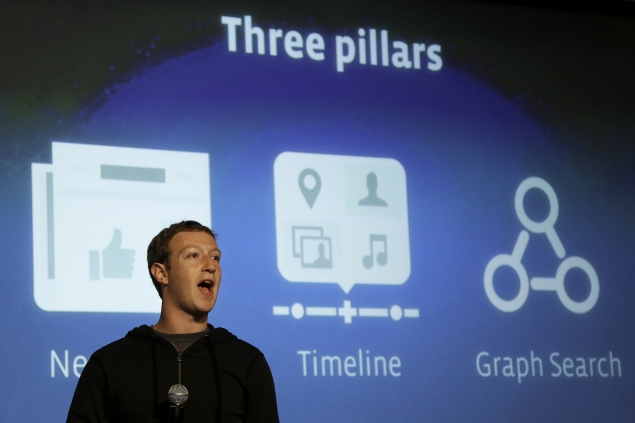
Graph Search can be used in a number of ways, including (but certainly not limited to):
- Search your own profile to quickly find (for example) photos taken at a particular time and place, and containing particular people.
eg. “Photos of me and my wife taken in Las Vegas before 2012” - Search for new connections by finding people your friends know who work at a particular place and share a common interest.
eg. “Friends of my friends who work at Coca Cola and like Biffy Clyro” - Find local businesses.
eg. “Chinese restaurants in Colchester”
Results will be ranked based on the level of social interaction your friends have had with the photo, person, place or interest you are searching for, combined with the affinity you have with those individuals (based on Facebook’s social algorithm, EdgeRank). Where there is no social connection, Bing results will be used to “fill in search gaps”.
Is it more likely that Graph Search will augment the current search process rather than radically change it?
Since the immediate benefits of Graph Search appear to be in the ‘social’ dimension it adds to search in a way that Google has been trying desperately to accommodate. I do believe that in the short term at least people will continue to go to Google for their facts-based questions – “When was the Battle of Hastings?”, “Who starred in Pulp Fiction?”, “What is £6 in Euros?” etc.
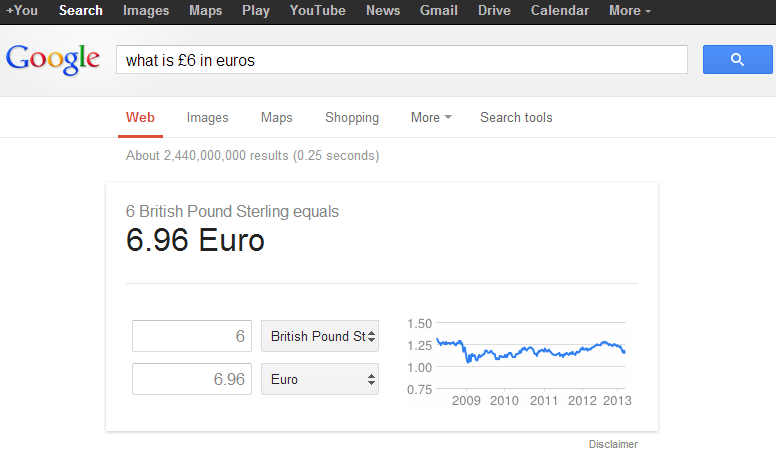
I can see people using Graph Search for “I wonder…” queries – “I wonder if anyone I know likes golf”, “I wonder whether any of my friends know where’s good to go out in Brighton”, “I wonder whether anyone I am friends with knows anyone who works at McDonalds” etc.
These may in fact both be applicable to the same query – if I am going for a night out in London and I want to know where’s good to eat, I’ll most likely head over to Google which I know will present me with a list of restaurants on a map, along with customer reviews etc. Once I have shortlisted 3 or 4 possibilities, I may then consult Graph Search to find out whether any of my friends have been to any of these restaurants before, and whether they have any personal recommendations.
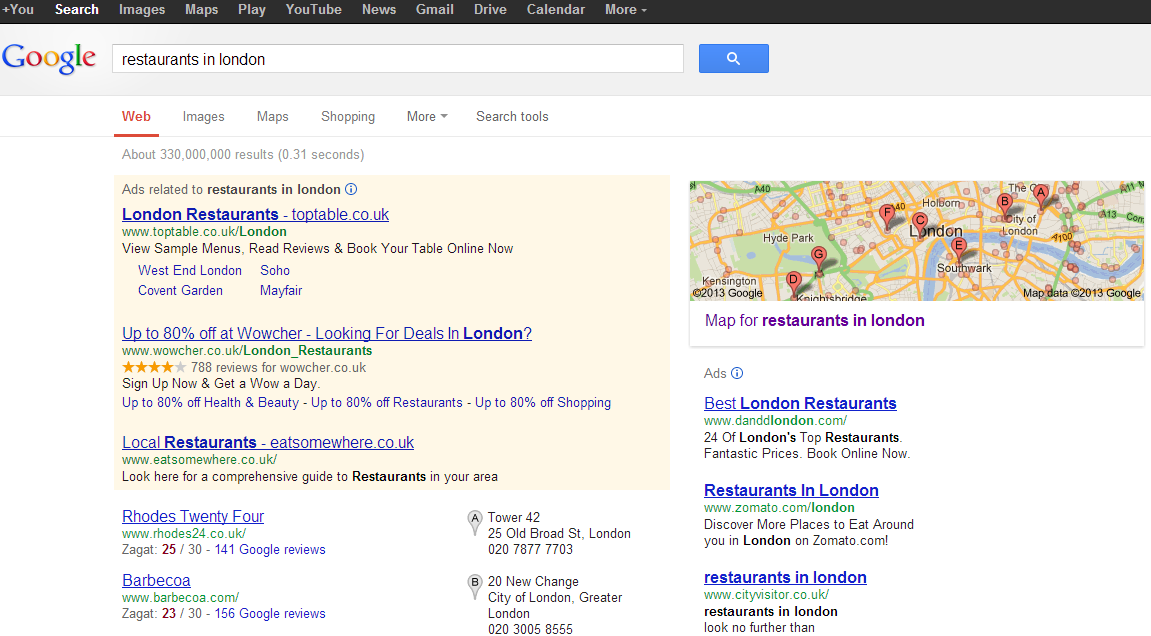
That all said, it may just be easier for me to just update my Facebook status with “Has anyone been to London on a night out? Where’s good to eat?”. This leads me to my next thought…
The Missing Social Dimensions
Graph Search may be able to link my friends to particular interests and activities, but different friends will have varying levels of relevance to different interests. For example, say I have a brother and a sister… my brother shares my love of steak but I rarely engage with him on Facebook, whereas my sister is a vegetarian, but we regularly ‘like’ and comment on one another’s status updates. If I used Graph Search to look for local restaurants, my results would favour those restaurants that my sister has ‘liked’ or ‘checked-in’ at (most likely vegetarian restaurants, and not what I’m after) – there is clearly a missing dimension in Facebook’s graph which I think is essential for these social recommendations to carry the required weight.
Another dimension which I think will be essential to the quality of social results is sentiment – since ‘likes’ and ‘check-ins’ are the currency with Graph Search, what about places that your friends would recommend you don’t visit? I may have a friend who checks in at a restaurant, and an hour later he/she may post a status update exclaiming that they’ve just been fed undercooked chicken… since status updates don’t appear to influence the ranking of social results, will this restaurant appear higher in my results because a friend checked in there, despite the fact that my friend would clearly now avoid it?
And if status updates are to be used to determine whether someone has something negative to say, what about a dentist? Imagine you’re sitting in a dentist’s waiting room waiting to have a tooth filled – you decide to check in with the following accompanying status… “Waiting to have my tooth filled – I HATE THE DENTIST!”. Perfectly reasonable – who doesn’t hate the dentist?! This would indicate negative sentiment toward this dentist, but it may be that actually the work was fine, the anaesthetic worked great and you now have a perfectly filled tooth and no pain… Facebook can’t know that.
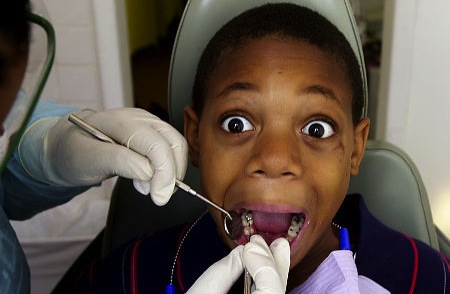
Bing Results Used to “Fill In Search Gaps”
On the face of things, Graph Search certainly appears to favour searches which have some manner of social intent – so how does Facebook deal with queries that have no relation to your social connections?
In the absence of a social connection, Graph Search offers an alternative ‘Web Search’ which essentially pulls Bing results in, both sponsored and organic. This could be the key to whether Graph Search comes up tops in the ‘Battle of the Search Engines’ – if I can perform both my facts-based queries and social queries in one place, why would I use 2 separate websites?
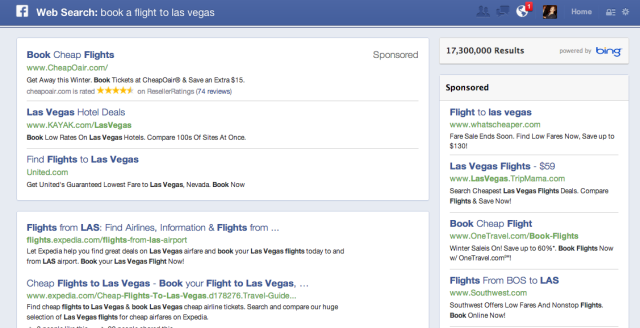
There are a number of factors to consider here, and in my opinion the most important factor is the fact that we have all become so accustomed to using Google to perform web searches – it’s even recognised by Collins Dictionary as a verb! For years people have consulted Google when looking to answer their web queries, and part of the reason people use Google over Bing is because their results are quite simply better – Google’s algorithm is streets ahead of Bing’s, and the quality of results is such that you are more likely to find the answer to your question quicker (and largely spam-free) by using Google.
The other factor that I think is important is that in Graph Search’s current state (and yes, I expect this to change), Bing results are not integrated into the default social results – it’s an alternative, meaning that you are effectively making the choice of whether to perform a social search or a web search. If I know I’m about to make a web search, I’m heading to Google.
For over a year Google have been battling to sign their users up to Google Plus, and in the USA Google has launched Search Plus Your World which essentially shoehorns socially influenced results into your web search, based on the users Google Plus connections and activity. In my opinion, this integration is the key to combining social and web search. Technically, since Facebook have such a huge amount of accurate, unbiased information about who you are, who you engage with and to what extent, and what yours and your connections’ interests are, they should be able to perform this integration far more effectively… but then again, they’d still be integrating with Bing – an inferior search engine (IMHO).

How do you think Facebook Users’ Behaviours will Change in Light of the Current Concerns Over Privacy and Graph Search?
Privacy was mentioned multiple times throughout Graph Search’s announcement, and it has certainly provoked a reaction on the wider web since. Back in December Facebook revamped their privacy settings to allow users to easily choose who can see what about them and the content that they engage with – these can be accessed via the padlock icon in the top right of your Facebook account.
The important thing to remember here is that Graph Search does not make available any information that you couldn’t have found already – it simply makes the process easier. If users are savvy and lock their accounts down so that only their friends can access their information, then they will only appear in searches performed by their friends. It’s the less web-savvy that have cause for concern over privacy here, and since they are in their nature less web-savvy, they’re less likely to realise that privacy is a problem for them.
Soon after Graph Search was made available in beta to the lucky few who were granted access, a website appeared showcasing some of the searches that had brought up potentially damaging information – searches included “employers of people who like racism” and “mothers of jews who like bacon”. This sparked a backlash by many people fearing their information could be used against them – it is worth noting again however that the people who had been associated with these traits will have had their accounts set to ‘public’.
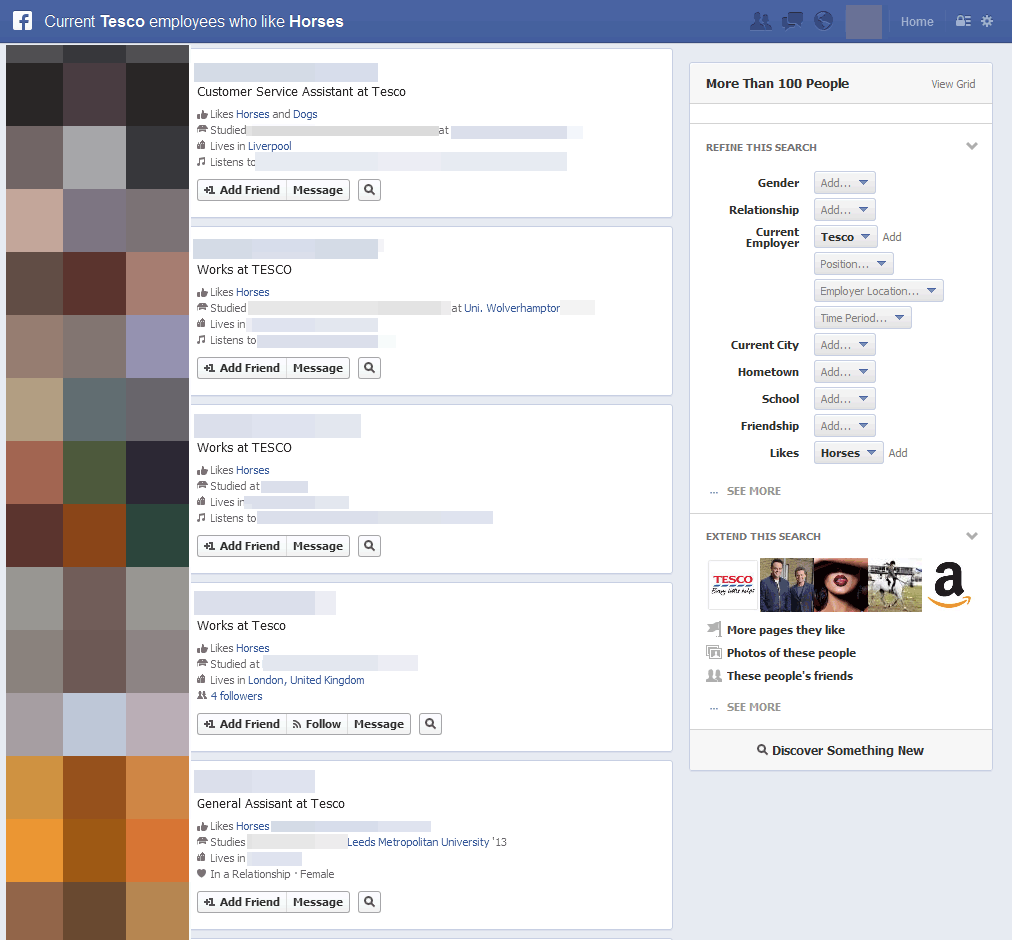
Will users end up going back through their history of ‘likes’ and start deleting those that they think may be used against them? If you’ve had an account for years then that may be a pretty huge job! Will these users start to modify their behaviour and be more cautious about what they do and don’t ‘like’? I think possibly yes, and I think that this could cause problems for Facebook – at the moment people feel free to like and to talk about whatever they want, they use Facebook as a sounding board and to vent their frustrations, and this is why the data that Facebook has about you is so valuable – it’s an honest reflection of you as a human being. If you use LinkedIn, you’ll most likely think twice about who’s profile you view because you know they will see that you’ve been looking, whereas on Facebook you’re free to look at an ex’s photos (for example…) safe in the knowledge she’ll never know.
It could be that employers will need to clamp down on their employees’ Facebook usage – if they are to be associated with particular interests that could potentially harm their reputation, it could be that they force their employees (to the best of their abilities) to disassociate themselves with their place on work on Facebook. It would be impossible to completely monitor employees’ behaviour on Facebook, but either way this would negate the networking/recruiting possibilities that Graph Search claims to offer – if I search for “friends of my friends who work at digital marketing agencies” and they haven’t associated themselves with the digital agencies they work for, the search will be fruitless.
Ultimately, I believe the more web savvy will lock down their profiles (if they haven’t already) at least to ‘friends’ level, and depending on the level of press coverage and backlash, the number of these ‘savvy’ internet users could be potentially huge.
In Summary…
The extent to which Graph Search will catch on remains to be seen, but we can be safe in the assumption that the final product will look very different to its current state – regardless, I believe Google will ultimately win the search engine battle when it comes to web search, and to refer to the initial question of whether Graph Search will simply augment the search process… I think that’s a fair assumption.
